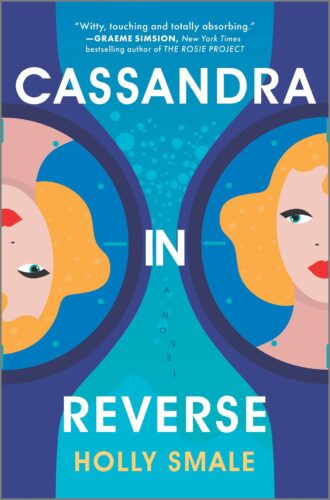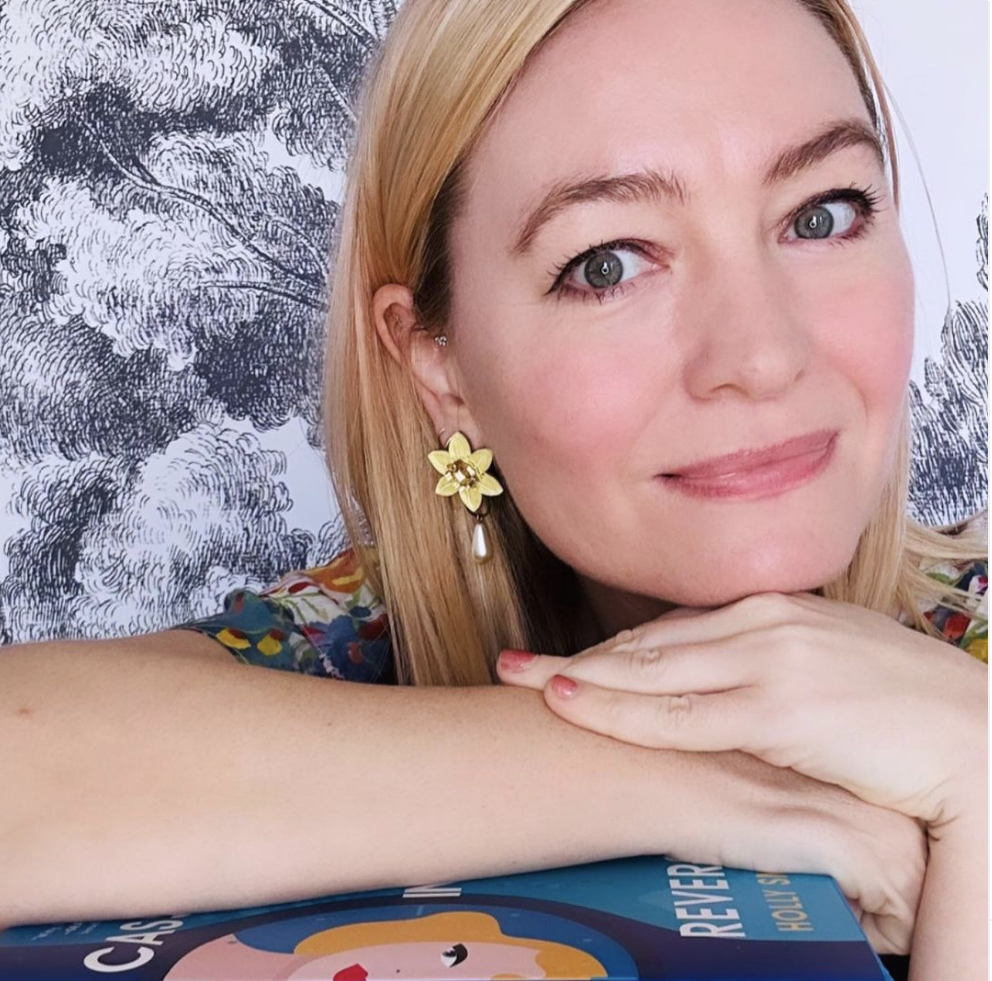I recently read Holly Smale’s Cassandra In Reverse, and I ADORED it. It’s smart, funny (like laugh-out-loud funny), sweet, strange, and SO lovely. So, when I was given the opportunity to chat with Smale, I JUMPED at the task.
Cassandra In Reverse follows Cassandra Dankworth, a creature of habit, who’s having a pretty rough day. Her boyfriend broke up with her this morning, and by lunchtime, she’s been fired from her PR job for not being a “people person”. Plus, her favourite café has run out of banana muffins. Then, something incredibly unexpected happens… Cassandra discovers she’s been gifted (or maybe cursed?) with the power to travel back in time, and realizes she has the chance to do things differently. But just because you have infinite chances to get things right, doesn’t mean that things won’t go wrong….
Intrigued? Well, keep on reading to learn a bit more about Cassandra, and Smale, the author who brought this magical book to life…
Ameema Saeed (AS): First of all, I adored Cassandra In Reverse! It was smart and vulnerable, and weaves genres and themes, including romance, and time travel, and Greek mythology. There was so much to love as a reader, but I’d love to know… What was your favourite part about writing this story?
HOLLY SMALE (HS): Thank you so much! Honestly, writing this book was the first time in my entire life I’ve been able to completely ‘unmask’ as an adult. Once I knew that Cassie was going to be autistic, like me, the only way I could possibly do that with any authenticity was to write my own experience as truthfully as possible, which meant allowing my brain to do exactly what it wanted to do. So I just… let go. I allowed myself to just be on the page, without shame and without hiding. I let Cassie have my weird behaviours, my strange way of speaking, my obsessions and emotions and random metaphors and repetitive habits that I tend to hide so that I’m more ‘likeable’. I let her see the world as I see it. It sounds narcissistic, but in many ways it was the opposite.
To write Cassie, I had to reveal parts of myself I’ve spent my life hating. I had to be vulnerable enough to let readers dislike her, or find her irritating or weird (which frankly they often find me in real life too). It wasn’t easy, and it required an element of courage. From a writing perspective, though, it was entirely liberating. I was essentially taking my ‘mask’ off for the first time in my life.

AS: Cassandra In Reverse is a love story – in more ways than one. I loved so many of the relationships in it, but my favourite was Cassandra’s relationship with herself. Her journey of self-discovery and self-love is not linear, nor is it easy, but it is resonant and powerful. Can you talk a bit more about what it means to be true to yourself, even when your understanding of who you are may change and develop?
HS: When you’re autistic, from birth you’re told that there’s something ‘wrong’ with you, even if nobody is quite sure what it is. I’ve spent most of my life feeling ‘broken’: as if my way of thinking and feeling and speaking and simply experiencing the world is abnormal, and should be hidden as much as possible if I want to be accepted. Finding a way to love yourself when others don’t is incredibly difficult, because we all tend to define our sense of ‘self’ through what we’re told by others: by society in general, by our peers, by the media, by the art we consume. It’s hard to stand against the world and be yourself.
Like a lot of people, my sense of self is constantly shifting and developing with age and with experience, and it’s not a straight line. For me, it has become about looking at my strengths and my weaknesses, and simply saying: I accept you. Without shame, without embarrassment; but also without too much pride or ego. So it’s more a self-neutrality, because you can love yourself without being perfect first. There’s so much relief in just letting yourself be.
AS: You’ve spoken about how when you were diagnosed with autism at the age of 39, it was a bit of a lightbulb moment for you, looking back at some of your behaviours and experiences over the course of your life. I’m a big advocate for representation in media, and I’m curious… Was there ever a moment when you were reading or watching something and you felt truly “seen”? What was that moment like for you?
HS: I think a common misconception is that late-diagnosed autistic people live their lives under the impression they’re completely normal, and an autism diagnosis is a total shock four decades in. That is pretty much never the case: we always know there’s something ‘going on’ with us, we’re just not sure what it is. And, because we know we’re different, we tend to search for ourselves in books, in TV, in films, in music: anything that makes us feel slightly less alone. And this has, historically, been incredibly difficult to do. As an autistic girl or woman there’s a huge lack of characters you can see yourself reflected in (especially ‘openly’ autistic ones).
But every now and then I’d find a character that felt like ‘me’ and the impact was enormous. Lisa Simpson was one of the first, followed by Anne of Green Gables. Beth from The Queen’s Gambit, and – when I was going through my diagnosis journey – Cristina from Grey’s Anatomy. With each of these characters, I’d instinctively think – ‘hey! That’s me!’ And, because they’re all fantastic, loveable, valuable and brilliant girls and women, there’d be an immediate sense of comfort and safety. It’s not just me.
Now that I know a lot more about autism, I’ve realized that every single character I connected to is ‘coded’ autistic: they have autistic traits that would be diagnosable if they were real humans. If I had known that – or if they were openly autistic from the beginning – it would have been a game-changer for me. It’s a big part of what has pushed me to write openly autistic characters: I want to be part of a narrative where everyone can see themselves and feel loved.
AS: Are there any books or writers that you feel have helped shape you as a writer?
HS: I’m a huge fan of Kate Atkinson: she has this joyful wit in her writing, and her books are luminous with warmth and observational humour. My love of Life After Life definitely influenced Cassandra In Reverse. She took a form of time-travel and made it this incredibly human, intimate and compassionate theme, rather than what can happen sometimes when it becomes too sci-fi. That’s what I wanted to do too. Take something that can be huge and world-changing, and make it domestic and warm and funny. Explore basic human relationships with this really massive narrative device, and use the repetition and looping to show how it actually feels to be autistic.
AS: It feels like we’re living in a time where neurodivergence is more broadly understood, or even accepted – with people, learning about the ways conditions like Autism and ADHD have historically been underdiagnosed, or underreported, especially in women. Is there a message you have for other readers who are grappling with their own “late” diagnoses as adults?
HS: My best advice is to process it at your own speed. Don’t look around at other people and wonder why they’re at a different stage to you, or feel shame for the way you feel. Your emotions (or lack thereof) are totally valid.
I’m super neurodiversity-positive now, but that’s taken me years of processing to get to. My initial reaction was horror, shame, repulsion, fear. I cried a lot. I felt incredibly confused and distressed. I felt angry that I’d been let down by everyone: my family, the education system, doctors. I had to look at my entire life with a totally different lens, and make sense of it all over again: like watching a foreign film with subtitles, so now you finally understand it. So, take your own time, feel what you need to feel and don’t bow to any pressure to ‘celebrate’ or ‘tell everyone’. It’s okay to grieve, or rage, or go into denial, or hide yourself away. It’s a huge thing, so don’t let anyone make you think that how you’re handling it is ‘wrong’. Feel how you need to feel. Self-love will come in time.
AS: Cassandra In Reverse is a lot of things, including a time travel story, and because of that, I have to ask – if you could travel back in time and see or experience one historical event, what would you travel back in time to?
HS: There are so many options, and – like Cassie – I think I’d be too overwhelmed to do any of them. But it would be amazing to go back to 1687 and stop the Parthenon from being blown up, or being used to – unbelievably – store gunpowder. It would be amazing to see it in its full glory, and maybe protect it from being destroyed in the first place.
AS: I’m a book person, so I’d love to know: What are you reading these days?
HS: When I’m promoting a book or writing a new one – which is most of the time at the moment – I have to be really careful about what I’m reading or watching on TV: I’m incredibly easy to influence and tend to absorb whatever I’m consuming. I live in constant fear of losing my own voice or story, so I tread extremely carefully. So, I intentionally pick books that are extremely different from what I write.
I’ve just finished the YOU series by Caroline Kepnes – a masterclass in narrative voice – and now I’ve just started reading Interview with a Vampire by Anne Rice. I’ll often turn to horror, like Let The Right One In by John Ajvide Lindqvist or The Ring by Koji Suzuki. Or a classic, like Anna Karenina (I’m still working my way through all the boring bits about farming). Basically, anything that feels like nothing like what I’m trying to write helps me to keep my work and my play separate, and allows me to just throw myself into different worlds without wariness or caution.
AS: Finally, if there’s one thing you want readers to take from Cassandra In Reverse, what would it be?
HS: I’d love people to just really enjoy escaping into a good story – that’s the main aim – but hopefully they’ll come away with just a little more proof that there is more than one right way of existing. We don’t all think the same, or feel the same, or act the same, and that’s a beautiful thing.
Holly Smale’s Cassandra in Reverse is out now. If you want to get to know Cassandra better, or just read a really incredible, really thoughtful story about time travel, self-love, and becoming true to who you are, pick it up from your local bookstore!
–
Ameema Saeed (@ameemabackwards) is a storyteller, a Capricorn, an avid bookworm, and a curator of very specific playlists, customized book recommendations, and cool earrings. She’s a bookseller, and the Books Editor for She Does the City, where she writes and curates bookish content, and book recommendations. She enjoys bad puns, good food, dancing, and talking about feelings. She writes about books, big feelings, unruly bodies, and her lived experiences, and hopes to write your next favourite book one day. When she’s not reading books, she likes to talk about books (especially diverse books, and books by diverse authors) on her bookstagram: @ReadWithMeemz




 Follow Us On Instagram
Follow Us On Instagram
